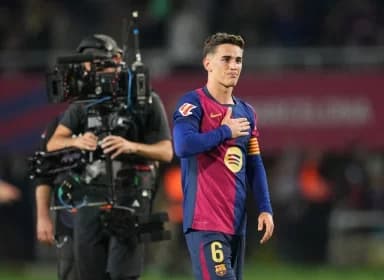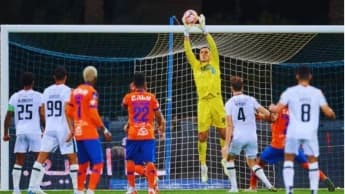Gavi's Criticism Unsettles Barcelona Dressing Room Dynamics

Barcelona faces internal strife as Gavi's critical remarks on Kounde's mistake stir discontent. Amidst a culture of unity, the club must navigate these tensions to maintain harmony and focus on their season's ambitions.
Barcelona, a club celebrated for its long-standing tradition of unity and excellence, is currently facing challenges following Gavi's sharp comments regarding Jules Kounde's defensive error during the 2-2 draw against Celta Vigo. This incident has seemingly disrupted the squad and raised questions about the team's cohesion in the locker room. As reported by SPORT, Gavi's public criticism has not only frustrated his teammate but has also drawn criticism from the club's higher-ups, including head coach Hansi Flick.
The situation escalated when Kounde's erroneous play resulted in Celta Vigo scoring their first goal. Although the French defender quickly accepted responsibility for his mistake, Gavi's remarks after the match were notably critical, describing the error as "silly" and implying that Kounde ought to have simply cleared the ball. In addressing the media, the young midfielder was candid: "The first goal we concede is a joke. He has to clear the ball. We need to learn; this is football."
This kind of straightforward criticism has allegedly caused unrest among the team. The coaching staff of Barcelona, under Flick’s leadership, has promptly come to Kounde’s defense, stressing the importance of the defender’s professionalism and his contributions to the squad. Flick emphasized that football requires teamwork, where both successes and shortcomings are collective responsibilities.
Despite the criticism, Kounde continues to be a reliable presence in the team. Flick's trust in the defender's skills remains steadfast, and the manager's reaction emphasizes Barcelona's dedication to nurturing a culture of shared responsibility. However, Gavi's comments have brought to light a persistent challenge for the Catalan club—the difficulty of managing public communication in a high-pressure setting.
This is not the first instance of Barcelona's internal dynamics being challenged by public comments. In the previous season, Ilkay Gundogan's candid nature captured attention on two significant occasions. Following a disappointing showing in El Clasico, Gundogan openly criticized the team's level of effort. Later in the season, he called out Ronald Araujo after Barcelona's exit from the Champions League against PSG. Both of these events reportedly caused divisions within the squad, with tensions remaining until Gundogan's departure at the season's end.
Barcelona's esteemed legacy has frequently been founded on the principles of unity and collective spirit; however, these recent incidents highlight the challenges that arise from competing at the pinnacle of sports. Gavi's remarks directed at Kounde, although possibly a reflection of youthful exasperation, prompt significant inquiries regarding the management of public accountability within the squad.
For Barcelona, it is crucial to promptly and effectively resolve the ongoing unrest. Flick and his coaching team are expected to stress the significance of internal cohesion as the squad faces a challenging season ahead. Striking a balance between accountability and unity will be essential for the club’s achievements, especially as they seek to uphold their supremacy in La Liga and progress further in European competitions.
Although Gavi’s enthusiasm and determination are defining features of his rising career, this incident highlights the importance of thoughtful communication—a lesson that even the most gifted players need to grasp. As things calm down, how Barcelona handles this sensitive issue will serve as a crucial test for their leadership, both on and off the field.






